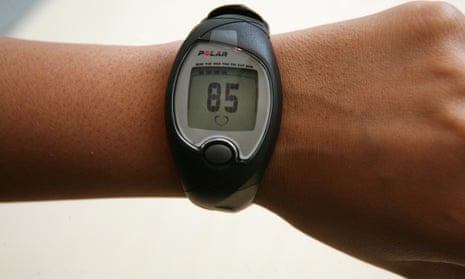Millions of people will receive devices and apps free on the NHS to help them manage conditions such as diabetes and heart disease in an major drive to use technology to reduce patient deaths.
NHS England’s chief executive, Simon Stevens, has backed the move as a significant expansion of self-care that could help prevent patients becoming seriously unwell and needing hospital treatment.
He wants people who already use apps such as Uber or Airbnb to show the same willingness to embrace digital technology that could alert them to the possible onset of a stroke, heart attackor deadly infection. The NHS will start making them available to patients in England from next year. If widely adopted, they could save tens of thousands of lives a year, Stevens said.
Stevens will also announce an overhaul of the NHS payments system on Friday, which will help technology companies that produce innovative devices to win fast-track approval and get their products into patients’ hands when they visit their GP or hospital consultant. He is creating a new “tariff”, the money a hospital receives for a course of treatment, that will offer them an incentive to make greater use of innovation and technology.
The devices, which can be strapped to the back of a smartphone, will be able to help patients detect and monitor atrial fibrillation. About 2.5 million people have the condition, which causes around 25,000 of the 110,000 strokes that occur annually and costs the NHS more than £2.2bn a year to treat. AliveCor, a mobile heart monitor, could help to prevent hospital admission and even death, while saving the NHS money by reducing the need for expensive treatment.
The NHS is already issuing patients in Portsmouth who have life-threatening breathing trouble with an app called MyCOPD. It helps those with chronic obstructive pulmonary disease, such as emphysema and bronchitis, to manage their condition on their smartphone or tablet. It advises them when to take their medication and how to do exercises that reduce the risk of them suffering an exacerbation of their illness, which could prove fatal.
A panel of experts will approve the first 10 to 15 such devices and apps later this year. Patients will be able to access them from April 2017.
In a speech to 1,000 NHS bosses, Stevens will urge doctors, nurses and NHS managers to “grab with both hands” the growing opportunities technology offers both to help promote health and tackle the service’s chronic financial problems by saving on treatment and rehabilitation costs.
He will voice frustration that, while Britain has played a key role in medical innovations such as IVF and organ transplants, it has been too slow to adopt technology as a key means of helping patients to manage illnesses and stay as healthy as possible. Until now, the NHS has been “penny-wise but pound-foolish” in refusing to pay for such devices, he will say.
“Millions of devices of different types will be funded via this route. For people with diabetes or heart disease, or pregnant women or acutely ill in-patients, there’s a huge opportunity to improve the quality of care and also save money in other parts of the NHS by getting millions of new medtech devices into the hands of doctors, nurses and therapists.
“The NHS has a proud track record of world firsts in medical innovation. Think hip replacements, IVF, vaccinations and organ transplants, to name just a few. But then getting wide uptake has often been slow and frustrating,” he will say.
“Now, at a time when the NHS is under pressure, rather than just running harder to stand still, it’s time to grab with both hands these practical new treatments and technologies.”
He cited the example of AliveCor, a mobile heart monitor that gives electrocardiogram readings – details of how someone’s heart is functioning – within 30 seconds, and can detect, monitor and manage arrhythmias, or irregular heartbeats. They are a key cause of sudden cardiac death, which kills 100,000 people across the UK every year.
“In the rest of our lives we’re seeing the difference that innovative tech makes, and now the NHS will have a streamlined way of getting groundbreaking and practical new technologies into the hands of patients and our frontline nurses, doctors and other staff. By doing that, we can transform people’s lives”, Stevens will say.
